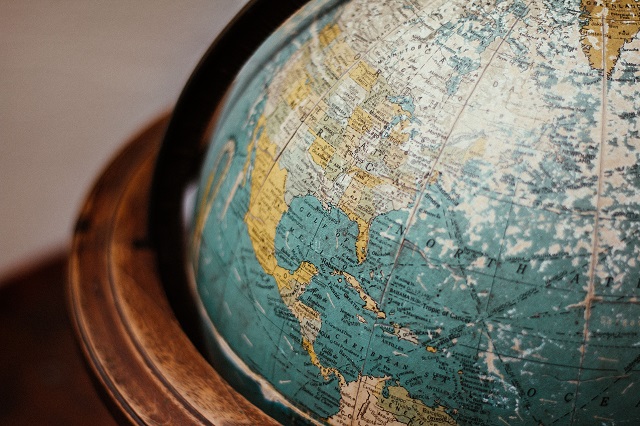Revisiting ‘Race’: Towards a Decolonial Curriculum Ideas
New in Ceasefire, Politics - Posted on Friday, October 30, 2020 10:30 - 4 Comments

(Image: Bekky Bekks/unsplash.com)
A Coherent Present
As the world has been rocked into introspection by George Floyd’s racist murder, a familiar story is being recounted. A story which, as I elaborate below, captures the colossal failures and betrayal of British school education in imparting vital elements of colonial history; occluding the violent histories of white ascendancy whilst continuing to maintain its hegemonic power within the ‘post-racial’ myth.
As is the case for many of my generation, history classes in our all-girls secondary school in the late eighties were exceptionally narrow. I recall tedious lessons on Anglo-Saxon history but little else. Whilst students hailed from richly diverse backgrounds, the curriculum felt monolithic. We were ‘taught’ a history about White people in White lands by White teachers. There was certainly a personal disconnect.
Only in the late nineties, when I opted for Post-Colonial Literature during my first degree, did Britain’s violent presence in other parts of the world become apparent. Chinua Achebe’s ‘Things Fall Apart’ set the wheels in motion. Shortly after, during my MA in International Development, Edward Said’s ‘Orientalism’ was pivotal. It is here that the concept of Britain having colonised large segments of the world’s population (one fifth by some accounts) with a sophisticated ideological machinery became obscenely clear and so it was ‘discovered’ like a hidden scandal. The scope and gravity of what I had been only remotely cognizant of as a young girl was now laid bare. ‘We are here because you were there,’ as A. Sivanandan memorably put it. The world had fallen into place.
This was the beginning of my real education as I see it. In hindsight, it is lamentable that a child can grow up in late 20th century Britain and attend its educational institutions yet find next to no cultural, racial or historical reference points that speak to them. What does this lack of clear historical trajectory mean for ‘Black and Asian’ identities if we are not meaningfully anchored in the place we call home?
I can hear my inquisitive ten-year-old ask, “But where was this ‘home’ and how did we get here? How was it that ‘the British’ were ‘there’; did someone invite them or was it more complicated than that”?
Today, this growing generation recognise very little of the graft and toil of the first ‘Black and Asian’ diaspora and all they had endured in this context. This is especially significant as the Covid-19 pandemic has engulfed so many from that very generation, causing a disproportionate loss to our communities. Once that generation passes, who will be left to tell their story, and the stories that shaped the world?
‘Our Island’; A Global Story
Three and four generations in from when our parents initially settled, Black and Asian children are currently reported to make up nearly 23.2% (secondary) and 27.6% (primary) of pupils in England and Wales. Yet, the glacial pace of change in the British history curriculum is damning. Even after the ‘watershed’ moment of the Macpherson report, why and how racism got here remains eclipsed from view. Instead of advancing, we have regressed back to discourses eulogising Britain’s ‘imperial greatness’; with Michael Gove’s 2013 attempted ‘reforms’ being a case in point.
At primary level, the most dominant way of including racialised ‘others’ is through the old ‘steel band and samosas’ model of celebratory festivals. Black history, for example, rarely receives more than a month’s worth of curricular coverage, and even this has been the subject of contestation. Any historical and cultural teaching remains confined to the Romans, Anglo-Saxons, Scots and Vikings. At Key Stage 3 (11-14 years), the only named statutory topic is the Holocaust, while learning about non-European civilisations (Islamic, Mayan and West African) remains an option bracketed into a handful of lessons.
Whilst there is more flexibility at secondary schools, academic research has identified it as ‘curiously limited in scope’; geographically, politically and in terms of the various axes of differentiation that would inevitably crop up in any meaningful account of imperial relations. The virtual absence of decolonising movements, for example, looms large, as does the way some taught histories remain imprinted in our consciousness (think Auschwitz) whereas others, such as the British concentration camps in Kenya, have failed to be written in at all. They remain buried, unaddressed and unaccounted for.
Critically, the role of women in the British colonies remains unexplored. As we know from the gendered economy of Empire, the colonies afforded some women power unavailable to them in the metropole, yet women’s empowerment remains an isolated topic in the history syllabus. This lack of interdisciplinarity only adds to an incoherent account of Britain’s past.
In this rather skewed curriculum, it is somewhat perplexing that children can be taught about Empires from a long bygone era, but not of the Empire that had such a decisive role in bringing their own fathers and mothers here. Instead, essential historical education is being sought out from decolonising consultants, exposing the outdated state of the national curriculum across disciplines.

(Image: LB/unsplash.com)
This highly filtered approach to history can no longer be attributed to the subject’s historically side-lined status. Rather, as recounted by Cannadine et al, it is symptomatic of a distinct hollering to “Britain’s nineteenth century imperial greatness”. For over the course of shifting political leadership, progressive gains to the national curriculum have oft been curtailed, resulting in less than meaningful inclusion of ‘Other’ histories which, as things stand, remain optional. Teaching Empire reflects this fraught terrain, where teachers lack knowledge, resources and support, with only the bravest willing to veer from the status quo.
Of course, the history of ‘Black and Asian’ peoples precedes any account of Empire, as do their contributions — scientific, cultural and literary. That our children are only taught the contributions and advances of White Euro civilisations entrenches their marginality in accounts of global development. Countering this narrative, we can see a number of burgeoning local initiatives, with the Runnymede Trust’s Our Migration Story Project perhaps one of the most wide-reaching in this regard. Established in 2016 as a wide collaborative initiative of academics, archives and associations, it represents an overarching historical timeline of case-studies covering two thousand years of migration. For teachers and home-schoolers, it is a goldmine and a reminder that through the longue durée we can better locate ourselves and contest the mirage of timeless European hegemony.
Nevertheless, we must not lose sight of the fact the drive for a broader and better curriculum is not merely about addressing the concerns of ‘Black and Asian’ communities regarding their identities and histories; it is about revisiting everyone’s history. This is equally, if not more, relevant to white Britons oblivious to their racial histories, appropriations and entitlements.
Indeed, as Alexander argues, ‘Black and Asian’ histories of the last 500 years are inextricably British and global. To frame this relationship in any other way is indicative of the racialised fault-lines that continue to manifest in discourses of (not) belonging and deportations; the inhumane Windrush scandal is a clear example. What does this tell us? That our histories are primarily manifest in scripted racist discourses often screaming for us to go ‘back home’.
Evidently, this epistemic violence continues to plague the curriculum and its reformers. We must bear in mind that recent calls for change follow a long history of interventions, and a Black Studies Movement that has not only sought to address the curricular deficit but enabled the means to survive routinised racism; something that no doubt resonates with racialised groups who have opted for home-schooling as a form of resistance to the White cultural exclusivism of mainstream education.
Ongoing resistance can be seen in the diverse range of academics, writers and activists lobbying for a holistic curriculum across disciplines. This is currently an increasingly pressing topic, as can be seen in the many online petitions seeking to replace ‘whitewashed’ accounts. High-fee-paying Private schools have not been invulnerable to this shift either, and must pay heed, particularly when a significant portion of their student intake, reportedly 35%, are BAME students.
Yet, the desire to resort to the ‘our island story’ framing has proved a defining feature of the struggle over the history curriculum (although not peculiar to the education sector). Pushback is typically undergirded by a fear that revised accounts will not fit with the nationalistic White British self-image. Boris’s ‘Etonian attitude’ regarding Empire ‘as a source for good’ is emblematic in this regard. Such myopic perspectives often rest on the view that we should only tell ‘the good bits’ but, as Deana Heath, Senior Lecturer in Colonial History at the University of Liverpool asks, “whose good bits exactly?”
This insular self-serving view requires dismantling. Indeed, an alternate history of Empire that includes ‘Black and Asian’ voices cannot be framed as supplementary to a narrative they are integral to. Consequently, this hegemonic parochialism is reflected in the whiteness of the discipline, yet is at odds with the stated aims of the curriculum to “gain a coherent knowledge and understanding of Britain’s past.” Without a global critical historical perspective, this aim will remain unfulfilled and contested. Having only served to inculcate a type of historical docility consistent with a ‘post racial’ neoliberalism, it is time we paid greater attention to the myth of this colour-blind curriculum.

(Image: Adolfo Felix/unsplash.com)
Recognising ‘Race’: (In)forming the Groundwork
Since the 1988 Education Reform Act, colour-blind policies have ostensibly underlined our national approach to education. In ‘post-racial’ Britain, the very concept of ‘race’ had disappeared from view, as did, apparently, the racism it engendered. Yet, within a number of academic and activist critiques, ‘race’ has long been established as a foundational axis in the Euro-colonising enterprise. It is common parlance in socio-historical disciplines to acknowledge the very ‘constructedness’ of ‘race’ and its durability over the past 500 years. In other words, the modern category of ‘race’ as we understand it today is not the reflection of a natural social order. It was created.
In this racialised economy, ‘Whites’ were posited at the apex of this hierarchy, ‘Blacks’ at the bottom and everyone else fell in between. This was a pseudo-science in which ‘whiteness’ and all other ‘race-based’ categories were classified, crafted and solidified in the service of Slavery and Empire. This fact has remained on the margins of social discourse, denied official recognition in the ‘post-racial’ fantasy of modern Britain, yet has been ironically rehabilitated in ‘newer’ ‘post-colonial’ racisms.
It is precisely this historical constitution of ‘race’ that deserves unpacking at a level that is accessible and relevant, spanning the spectrum of disciplines it permeates. A revised curriculum would do well to introduce this into our collective histories and conscience.
As academic conversations contest and advance the discredited ‘race’ debate, the rest of the sector should not remain oblivious to these exchanges. Nor should these historical insights belatedly come crashing in at university level. Indeed, they deserve to be presented to pupils much earlier, especially since they inform our understanding of how ‘race’ continues to perform, institute and distinguish — not as some bygone historical memory but as lived reality.
Why this becomes important for children cannot be overstated. For if it is understood that categories of ‘race’ were central to the making of the modern world, and continue to be part of a dominant social order cultivated across multiple disciplines, it also means they can potentially be destabilised — at the very least in terms of their epistemic foundations. It is arguably the explanatory power of ‘race’ as it has been used to demarcate ‘enlightened’ populations from ‘Others’ that brings coherence to the present condition. Understanding this also fulfils the dual imperatives of ‘knowledge and skill’ central to the study of history, whilst also foregrounding how it is that Britain has invariably been conceived in the popular/political imagination as an inherently White space/nation; not just then, but now. Yet ‘race’ remains a fundamental blind-spot in the current history curriculum. It simply does not figure in defining how ‘the nation was shaped’.
This does represent something of a colossal ‘oversight’, particularly given the now banal acknowledgement that whilst the formal apparatus of Empire has been dismantled, the racist discourses that sustained it are very much still with us; albeit often morphing and reinvigorated in benign discourses. Indeed, the curriculum remains but one cog in an educational system in which racism is endemic. This is an uncomfortable truth, but the ‘post-racial’ curriculum cannot conceal what our children detect all too often in their daily interactions. Indeed, in current times this palpable disjuncture between broader cultural knowledge and formal pedagogy is only increasing the scope for discontent. For predominantly white schools which may consider such histories irrelevant to their student demographic, this is equally salient.
The Decolonial Nexus; Agitating for Change
Arguably, then, teaching the political history of ‘race’ itself is key to achieving a decolonised and holistic curriculum. Integral to geographical journeys of Empire, global relationships and textual diversity, it can pave the way for a critical epistemological re-orientation, in the classroom and beyond. In this decolonial endeavour, however, there is greater need to transmit critical knowledge from the academy into the playground. This is where the channel between academic ‘race’ work and school curriculums is particularly narrow and needs prizing open to better inform school curriculums. Making these connections is part of the same decolonising struggle and certainly no less relevant to universities which have themselves been home to fierce decolonising campaigns.
The Black Lives Matter movement has reignited calls for structural change. How we envisage this pragmatically requires wholesale macro and micro shifts, but nothing that has not (in part) potentially already been proposed under a more willing leadership. Clearly, this is no small feat with a political establishment in Westminster that believes ‘a diversity of thought’ sufficiently makes up for the transformative presence of Black and Asian voices, or which remains unwilling to review the curriculum; unlike their more progressive Welsh counterparts.
Nonetheless, it is worth remembering that whilst taught histories have repeatedly reverted to the ‘traditional’ model, other areas of the curriculum — such as Citizenship/PSHE — have expanded to achieve statutory status. There is scope and enthusiasm for similar shifts, as academics and activists continue to agitate for them. No doubt these voices will be met with claims of partisanship. However, the imperative to seek credible and reflexive accounts of (‘post’ and ‘pre’) colonial histories remain.
There are glimmers of hope in the way the topic of ‘race,’ slavery and Empire are being unearthed, re-taught and harmonised across political and academic communities. Much groundwork has already been laid out, and the precedent for a model research centre to connect historical knowledge to schools is already well established. The Connected Sociologies Curriculum Project is building on existing initiatives with the potential to help bear out the efforts of so many. This collective labour can work towards reformulating the narrative of imperial ‘triumph’ that has for so longed muffled our de-colonial horizon.
In memory of my father Hajji Ghulam Nabi, who passed away on the 29th April 2020.
A special Thanks to Professor Claire Alexander for her feedback.
4 Comments
Asma S.
Shaida Nabi
Thankyou Asma, thats good to hear. And sincerely grateful for your duas.
Shai
Okello Ogwang
Great stuff, good reading I am making of it ahead of my forthcoming course on African literature and critical traditions, in which sometimes race escapes us, in tropical Africa, largely be a combination of default and intellectual design. Okello.
D D
Excellent piece Shaida. Brilliantly narrated and very well structured.
Condolences to you and family.


Excellent work, Shaida. One of the most comprehensive and culturally relevant articles I have read on decolonisation. Will definitely refer back to this in a paper I’m writing on the same topic.
Also, your dedication to your father (الله يرحمه) is touching. Duaas for you and your family